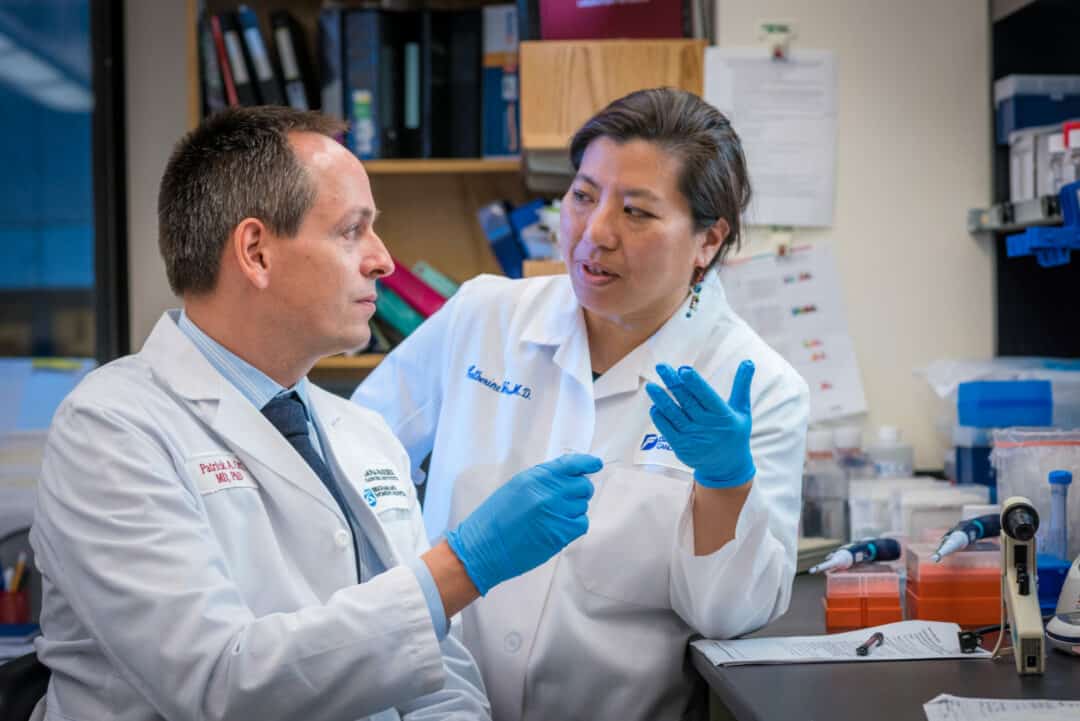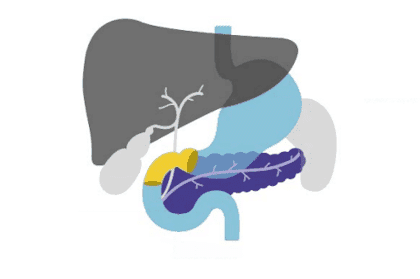To improve outcomes for people with pancreatic cancer, Pancreatic Cancer UK is investing in research that will help us detect early, treat better and ultimately save lives.
Thanks to our generous supporters, we have so far invested £14.4 million (approx. £19.6 million) in research into the early detection and treatment of pancreatic cancer.
Pancreatic cancer is difficult to treat. Currently, the only way to potentially cure pancreatic cancer is through surgery. However, only about 10% of people can be operated on.
This is largely because most people are diagnosed at a late stage, when the disease has already spread around the body. Even for those who can be operated on, the cancer often returns. So why is pancreatic cancer so difficult to treat, and what are we doing about it?


Tackling the challenge of treating pancreatic cancer
A unique feature of pancreatic cancer is a tough outer fortress of scar-like tissue surrounding the tumor. This protective layer allows the cancer cells to effectively hide from the immune system, as well as treatments such as chemotherapy and radiation aimed at destroying them. Finding ways to weaken this tough protective layer is currently an active area of research.
If we can weaken this outer layer and allow treatments to reach the tumor cells more easily, this could improve the effectiveness of existing treatments. For example, Dr. Petros Mouratidis at the Institute of Cancer Research is investigating how to combine techniques such as focused ultrasound, which damages and weakens tumor cells, with immunotherapy, which increases the power of the immune system to destroy cancer cells altogether.
Current treatments for pancreatic cancer are not very effective and cause significant side effects. In addition, relatively small amounts of the drug actually reach the cancer cells themselves, with larger amounts damaging healthy tissue elsewhere and causing unwanted side effects. Dr George Williams at the University of Southampton is developing a new way of delivering chemotherapy directly to the tumor cells, so that more of the drug reaches cancer cells and reduces treatment side effects.
One of the reasons survival rates for pancreatic cancer are so low is that many people with pancreatic cancer are not diagnosed until after their cancer has already spread around the body, at which point surgery is not an option. Dr Gianluca Mucciolo at the University of Cambridge is studying pancreatic cancer that has spread to the liver, to identify differences between tumor cells in the pancreas and other sites, with the aim of developing new treatments for advanced pancreatic cancer.
To improve the treatment of pancreatic cancer, we also need to learn from advances in other types of cancer. Research in Scotland led by Dr. Kirsteen Campbell is investigating whether treatments that have been effective in blood cancers can also be used to improve the treatment of pancreatic cancer.
Bringing the research community together
To tackle the major challenge of treating pancreatic cancer, we need to bring together the greatest scientific minds to work on this together. This is why we have launched our Interdisciplinary Treatment Grants, which will allow researchers working in different fields of science to join forces to improve current treatments or find new therapeutic targets and approaches.
“We have an obligation to start developing new treatments now, otherwise by the time we achieve breakthroughs in earlier discovery, we will still not be able to treat people.”
Dr. Giulia Biffi, University of Cambridge
It is crucial that alongside early detection research, we also invest in treatment research. Early detection of pancreatic cancer will be revolutionized over the next five years with exciting initiatives such as the first breath test for pancreatic cancer gaining momentum and the development of new treatments taking time. We must be ready to back up the early detection revolution with new and more effective treatments, to achieve our ambitious goals of doubling survival for this devastating disease.
Source: Pancreatic Cancer UK










